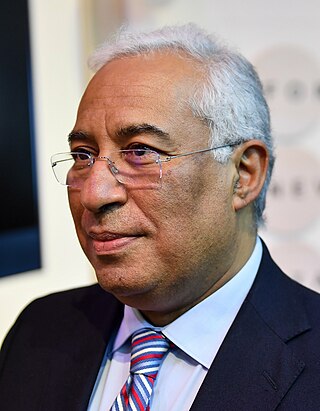
The I Constitutional Government of Portugal was the first non-provisional government of the Third Portuguese Republic, following the promulgation of the new Constitution of Portugal in April 1976. It had Mário Soares as the Prime Minister and lasted from 23 July 1976 to 23 January 1978.
Events in the year 1979 in Portugal.

The XIX Constitutional Government of Portugal was the 19th government of the Third Portuguese Republic, under the current Constitution. It was in office from 21 June 2011 to 30 October 2015, and was formed by a centre-right coalition between the Social Democratic Party (PSD) and the CDS – People's Party (CDS–PP). Pedro Passos Coelho, leader of the PSD, served as Prime Minister.

The XX Constitutional Government of Portugal was the 20th government of the Third Portuguese Republic, under the current Constitution. It was in office between 30 October 2015 and 26 November 2015, and was formed by a centre-right coalition between the Social Democratic Party (PSD) and the CDS – People's Party (CDS–PP), which ran together in the 2015 legislative election under the name Portugal Ahead. Pedro Passos Coelho, leader of the PSD, served as Prime Minister.
Acácio Pereira Magro was a Portuguese academic, economist and politician.

The XXII Constitutional Government of Portugal was the 22th government of the Third Portuguese Republic, under the current Constitution. It was established on 26 October 2019 as a Socialist Party (PS) minority government, led by Prime Minister António Costa, and ended on 30 March 2022.

The II Constitutional Government of Portugal was the second government of the Third Portuguese Republic. It had Mário Soares as the Prime Minister and lasted from 23 January 1978 to 29 August 1978.
The III Constitutional Government of Portugal was the third government of the Third Portuguese Republic. It had Alfredo Nobre da Costa as the Prime Minister and lasted from 29 August 1978 to 22 November 1978.
The IV Constitutional Government of Portugal was the fourth government of the Third Portuguese Republic. It had Carlos Mota Pinto as the Prime Minister and lasted from 22 November 1978 to 1 August 1979.

The VI Constitutional Government of Portugal was the sixth government of the Third Portuguese Republic, in office from 3 January 1980 to 9 January 1981. It was formed by a centre-right coalition between the Social Democratic Party (PSD), the Democratic and Social Center (CDS) and the People's Monarchist Party (PPM), which ran together in the 1979 and 1980 legislative elections as the Democratic Alliance (AD). Francisco Sá Carneiro, leader of the PSD, was the Prime Minister, and Diogo Freitas do Amaral, leader of the CDS, was Vice Prime Minister.

The VII Constitutional Government of Portugal was the seventh government of the Third Portuguese Republic, in office from 9 January 1981 to 4 September 1981. It was formed by a centre-right coalition between the Social Democratic Party (PSD), the Democratic and Social Center (CDS) and the People's Monarchist Party (PPM), which ran together in the 1980 legislative election as the Democratic Alliance (AD). Francisco Pinto Balsemão was the Prime Minister.

The VIII Constitutional Government of Portugal was the eighth government of the Third Portuguese Republic, in office from 4 September 1981 to 9 June 1983. It was formed by the centre-right coalition Democratic Alliance (AD), which was composed of the Social Democratic Party (PSD), the Democratic and Social Center (CDS) and the People's Monarchist Party (PPM). Francisco Pinto Balsemão, leader of the PSD, was the Prime Minister. Diogo Freitas do Amaral, leader of the CDS, was Vice Prime Minister.

The IX Constitutional Government of Portugal was the ninth government of the Third Portuguese Republic, in office from 9 June 1983 to 6 November 1985. It was formed by a coalition between the Socialist Party (PS) and the Social Democratic Party (PSD), which became known as the Central Bloc due to both parties centrist political positioning. It was the third term of Mário Soares, leader of the PS, as Prime Minister.

The X Constitutional Government of Portugal was the tenth government of the Third Portuguese Republic, in office from 6 November 1985 to 17 August 1987. It was formed by members of the Social Democratic Party (PSD) and had Aníbal Cavaco Silva, leader of the PSD, as Prime Minister.

The XI Constitutional Government of Portugal was the 11th government of the Third Portuguese Republic, in office from 17 August 1987 to 31 October 1991. It was formed by members of the Social Democratic Party (PSD) and had Aníbal Cavaco Silva, leader of the PSD, as Prime Minister. It was the first single-party government with an absolute majority in the Assembly of the Republic since the Carnation Revolution.

The XII Constitutional Government of Portugal was the 12th government of the Third Portuguese Republic, in office from 31 October 1991 to 28 October 1995. It was formed by members of the Social Democratic Party (PSD) and had Aníbal Cavaco Silva, leader of the PSD, as Prime Minister.

The XIII Constitutional Government of Portugal was the 13th government of the Third Portuguese Republic, under the Portuguese Constitution of 1976. The government was in office from 28 October 1995 to 25 October 1999 and was formed by members of the Socialist Party (PS), the party with the most votes and elected members for the Assembly of the Republic following the 1995 legislative election. António Guterres, leader of the PS, served as Prime Minister.

The XIV Constitutional Government of Portugal was the 14th government of the Third Portuguese Republic, under the Portuguese Constitution of 1976. The government was in office from 25 October 1999 to 6 April 2002 and was formed by members of the Socialist Party (PS), the party with the most votes and elected members for the Assembly of the Republic following the 1999 legislative election. António Guterres, leader of the PS, served as Prime Minister.

The XVI Constitutional Government of Portugal was the 16th government of the Third Portuguese Republic, under the Portuguese Constitution of 1976. It was in office from 17 July 2004 to 12 March 2005, and was formed by the centre-right coalition between the Social Democratic Party (PSD) and the CDS – People's Party (CDS–PP) that was started in the previous government. Pedro Santana Lopes, leader of the PSD, served as Prime Minister.

The XVII Constitutional Government of Portugal was the 17th government of the Third Portuguese Republic, under the Portuguese Constitution of 1976. It was in office from 12 March 2005 to 26 October 2009, and was formed by the members of the Socialist Party (PS). José Sócrates, leader of the PS, served as Prime Minister.













